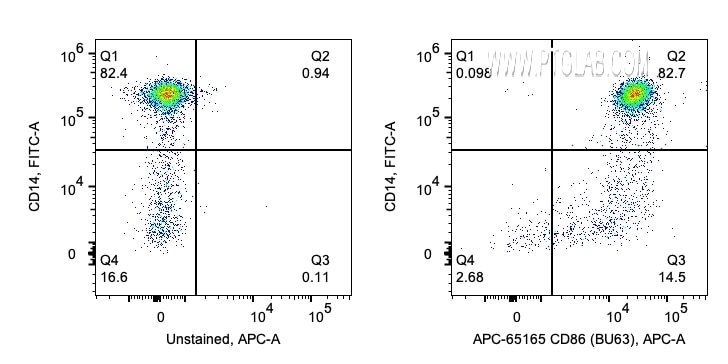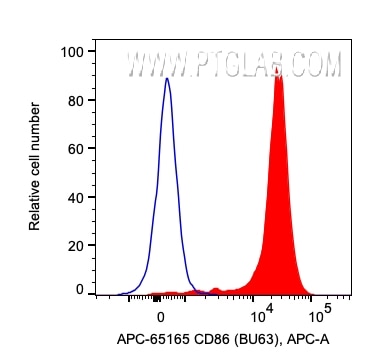Anticorps Monoclonal anti-CD86
CD86 Monoclonal Antibody for FC
Hôte / Isotype
Mouse / IgG1, kappa
Réactivité testée
Humain
Applications
IF, FC
Conjugaison
APC Fluorescent Dye
CloneNo.
BU63
N° de cat : APC-65165
Synonymes
Galerie de données de validation
Applications testées
| Résultats positifs en cytométrie | CMSP humaines, |
Dilution recommandée
| Application | Dilution |
|---|---|
| This reagent has been pre-titrated and tested for flow cytometric analysis. The suggested use of this reagent is 5 µl per 10^6 cells in a 100 µl suspension or 5 µl per 100 µl of whole blood. | |
| Sample-dependent, check data in validation data gallery | |
Applications publiées
| IF | See 2 publications below |
| FC | See 4 publications below |
Informations sur le produit
APC-65165 cible CD86 dans les applications de IF, FC et montre une réactivité avec des échantillons Humain
| Réactivité | Humain |
| Réactivité citée | Humain |
| Hôte / Isotype | Mouse / IgG1, kappa |
| Clonalité | Monoclonal |
| Type | Anticorps |
| Immunogène | Lignée cellulaire B-lymphoblastoïde ARH 77 |
| Nom complet | CD86 molecule |
| Masse moléculaire calculée | 329 aa, 38 kDa |
| Numéro d’acquisition GenBank | BC040261 |
| Symbole du gène | CD86 |
| Identification du gène (NCBI) | 942 |
| Conjugaison | APC Fluorescent Dye |
| Excitation/Emission maxima wavelengths | 650 nm / 660 nm |
| Forme | Liquide |
| Méthode de purification | L'anticorps purifié est conjugué à l'allophycocyanine (APC) dans des conditions optimales. Le conjugué est purifié par chromatographie d'exclusion de taille. |
| Tampon de stockage | PBS with 0.09% sodium azide |
| Conditions de stockage | Store at 2-8°C. Avoid exposure to light. Stable for one year after shipment. |
Informations générales
CD86 (also known as B7.2) is a costimulatory molecule belonging to the immunoglobulin superfamily. Primarily expressed on antigen-presenting cells (APCs), including B cells, dendritic cells, and macrophages, CD86 is the ligand for two proteins at the cell surface of T cells, CD28 antigen and cytotoxic T-lymphocyte-associated protein 4. Binding of CD86 with CD28 antigen is a costimulatory signal for activation of the T-cell. Binding of CD86 with cytotoxic T-lymphocyte-associated protein 4 negatively regulates T-cell activation and diminishes the immune response.
Protocole
| Product Specific Protocols | |
|---|---|
| FC protocol for APC CD86 antibody APC-65165 | Download protocol |
| Standard Protocols | |
|---|---|
| Click here to view our Standard Protocols |
Publications
| Species | Application | Title |
|---|---|---|
Cell Death Discov A positive feedback loop: RAD18-YAP-TGF-β between triple-negative breast cancer and macrophages regulates cancer stemness and progression. | ||
Inflammation ROS-Induced Gingival Fibroblast Senescence: Implications in Exacerbating Inflammatory Responses in Periodontal Disease | ||
Front Immunol Identification of a distinct cluster of GDF15high macrophages induced by in vitro differentiation exhibiting anti-inflammatory activities | ||
J Agric Food Chem Novel Collagen Analogs with Multicopy Mucin-Type Sequences for Multifunctional Enhancement Properties Using SUMO Fusion Tags | ||
Adv Sci (Weinh) Senescent Fibroblasts Drive FAP/OLN Imbalance Through mTOR Signaling to Exacerbate Inflammation and Bone Resorption in Periodontitis | ||
Cell Death Dis Tumor-derived exosomal CCT6A serves as a matchmaker introducing chemokines to tumor-associated macrophages in pancreatic ductal adenocarcinoma |
Avis
The reviews below have been submitted by verified Proteintech customers who received an incentive for providing their feedback.
FH Julie (Verified Customer) (08-26-2025) | Used at 5uL per 100uL sample containing approximately 4-5 x 10^5 cells, has worked well every time. Used as a single stain and samples ran within one hour without fixing.
|



